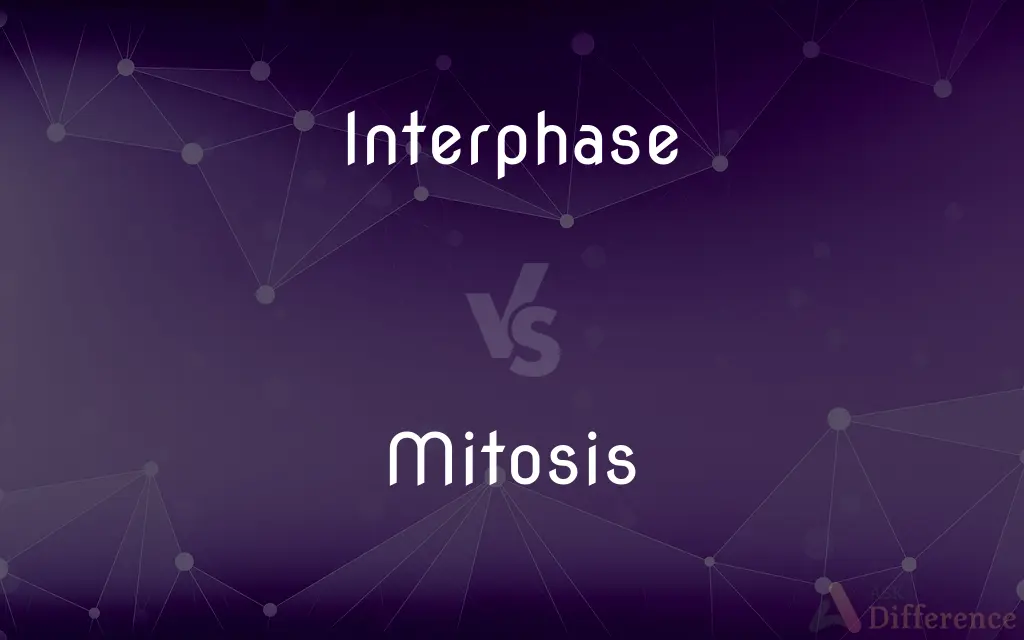Interphase vs. Mitosis — What's the Difference?
By Tayyaba Rehman & Urooj Arif — Updated on March 21, 2024
Interphase is the phase of the cell cycle where a cell grows, duplicates its DNA, and prepares for division, while mitosis is the process of cell division, resulting in two genetically identical daughter cells.

Difference Between Interphase and Mitosis
Table of Contents
ADVERTISEMENT
Key Differences
Interphase, the longest phase of the cell cycle, involves the cell growing, replicating its DNA during the S phase, and preparing for division. It is divided into three stages: G1 (cell growth), S (DNA synthesis), and G2 (preparation for mitosis). Mitosis, on the other hand, is a shorter, distinct phase that follows interphase and involves the division of the cell's nucleus into two identical nuclei.
During interphase, the cell's metabolic activity is high as it performs its regular functions, synthesizes proteins, and accumulates the resources necessary for division. In contrast, mitosis focuses on distributing the replicated DNA into two daughter nuclei through a series of steps: prophase, metaphase, anaphase, and telophase, followed by cytokinesis, which divides the cell's cytoplasm.
The primary purpose of interphase is to prepare the cell for division by ensuring it is adequately grown and the DNA is correctly duplicated without errors. Mitosis ensures that each daughter cell receives an exact copy of the parent cell's DNA, maintaining genetic consistency across generations of cells.
In terms of visibility under a microscope, chromatin (DNA material) is loosely arranged and not easily visible during most of interphase, making the nucleus appear homogeneous. During mitosis, however, chromatin condenses into visible chromosomes, allowing for the observation of the stages of mitosis and the distribution of chromosomes.
Genetic material in interphase is in the form of chromatin to facilitate DNA replication and transcription. During mitosis, this genetic material condenses into chromosomes to ensure accurate and efficient segregation of DNA between the two daughter cells.
ADVERTISEMENT
Comparison Chart
Duration
Longest phase of the cell cycle
A shorter, distinct phase following interphase
Stages
G1, S, G2
Prophase, metaphase, anaphase, telophase, cytokinesis
Purpose
Cell growth, DNA replication, preparation for division
Division of nucleus and cytoplasm to form two daughter cells
Cell Activity
High metabolic activity, regular functions, DNA synthesis
DNA segregation, cell division
DNA Form
Chromatin, for replication and transcription
Chromosomes, for accurate segregation
Compare with Definitions
Interphase
Cell Growth.
In the G1 phase, the cell grows and performs its normal functions.
Mitosis
Chromosome Visibility.
Chromosomes become visible as chromatin condenses, allowing segregation.
Interphase
DNA Replication.
During the S phase, DNA is replicated, ensuring each daughter cell will receive a complete set.
Mitosis
.
Interphase
Chromatin State.
DNA is in the form of chromatin, facilitating replication and function.
Mitosis
Stages of Division.
The cell undergoes prophase, metaphase, anaphase, and telophase, followed by cytokinesis.
Interphase
Metabolic Activity.
Cells are metabolically active, synthesizing proteins and growing
Mitosis
Nuclear Division.
Mitosis divides the parent cell's nucleus into two daughter nuclei.
Interphase
Preparation for Division.
The G2 phase involves preparations for mitosis, including protein synthesis.
Mitosis
Genetic Consistency.
Mitosis ensures each daughter cell receives an identical set of chromosomes.
Interphase
Interphase is the portion of the cell cycle that is not accompanied by gross changes under the microscope, and includes the G1, S and G2 phases. During interphase, the cell grows (G1), replicates its DNA (S) and prepares for mitosis (G2).
Mitosis
Division Completion.
Cytokinesis divides the cytoplasm, resulting in two genetically identical daughter cells.
Interphase
The stage of a cell between two successive mitotic or meiotic divisions.
Mitosis
In cell biology, mitosis () is a part of the cell cycle in which replicated chromosomes are separated into two new nuclei. Cell division gives rise to genetically identical cells in which the total number of chromosomes is maintained.
Interphase
(biology) The stage in the life cycle of a cell between two successive mitotic or meiotic divisions.
Mitosis
A type of cell division that results in two daughter cells each having the same number and kind of chromosomes as the parent nucleus, typical of ordinary tissue growth
The single large egg cell subdivides by repeated mitosis
Each mitosis seems to be associated with an increase in calcium
Interphase
(mechanical engineering) An indistinct region in the interface between two substances in composite materials.
Mitosis
The process in cell division by which the nucleus divides, typically consisting of four stages, prophase, metaphase, anaphase, and telophase, and normally resulting in two new nuclei, each of which contains a complete copy of the parental chromosomes.Also called karyokinesis.
Interphase
Between phases
Mitosis
The entire process of cell division including division of the nucleus and the cytoplasm.
Mitosis
(cytology) The division of a cell nucleus in which the genome is copied and separated into two identical halves. It is normally followed by cell division.
Mitosis
See Karyokinesis.
Mitosis
Cell division in which the nucleus divides into nuclei containing the same number of chromosomes
Common Curiosities
What happens if a cell skips part of interphase?
Skipping parts of interphase can lead to incomplete DNA replication or insufficient cell resources, resulting in faulty cell division.
What is the main difference between interphase and mitosis?
Interphase is the cell's preparation phase for division, involving growth and DNA replication, while mitosis is the actual process of cell division.
Can mitosis occur without interphase?
No, interphase is crucial for preparing the cell for division, ensuring the successful completion of mitosis.
How does the cell ensure genetic material is accurately distributed during mitosis?
By condensing DNA into chromosomes, ensuring each daughter cell receives an identical set during division.
Is DNA replication a part of mitosis?
No, DNA replication occurs during the S phase of interphase, before mitosis begins.
What role does cytokinesis play in cell division?
Cytokinesis is the final step, dividing the cytoplasm and organelles into two new cells, completing the process of cell division.
How do cells control the transition from interphase to mitosis?
Cells use checkpoints, particularly at the end of G2 phase, to ensure they are ready to enter mitosis.
Can interphase be observed under a microscope?
Yes, but chromatin is less visible than chromosomes; the nucleus appears homogeneous.
How does the environment affect interphase and mitosis?
Environmental conditions like nutrient availability can affect the duration of interphase and the rate of cell division.
Why is interphase important for mitosis?
It ensures the cell is ready for division, with sufficient size and duplicated DNA, essential for successful mitosis.
What are the consequences of errors in mitosis?
Errors can lead to genetic abnormalities in daughter cells, potentially causing diseases like cancer.
How do cells maintain their identity through mitosis?
By accurately replicating and distributing DNA, ensuring each daughter cell has the same genetic information as the parent.
What mechanisms are in place to prevent incomplete or erroneous mitosis?
Checkpoints throughout the cell cycle, especially before mitosis, ensure cells only proceed when conditions are optimal.
Why is the G2 phase important?
It ensures the cell has all the proteins necessary for mitosis and checks for DNA replication errors.
What is the significance of the S phase in interphase?
It's crucial for duplicating the cell's DNA, ensuring genetic material is ready for division.
Share Your Discovery

Previous Comparison
Component vs. Componentry
Next Comparison
Promyelocyte vs. MyelocyteAuthor Spotlight
Written by
Tayyaba RehmanTayyaba Rehman is a distinguished writer, currently serving as a primary contributor to askdifference.com. As a researcher in semantics and etymology, Tayyaba's passion for the complexity of languages and their distinctions has found a perfect home on the platform. Tayyaba delves into the intricacies of language, distinguishing between commonly confused words and phrases, thereby providing clarity for readers worldwide.
Co-written by
Urooj ArifUrooj is a skilled content writer at Ask Difference, known for her exceptional ability to simplify complex topics into engaging and informative content. With a passion for research and a flair for clear, concise writing, she consistently delivers articles that resonate with our diverse audience.














































